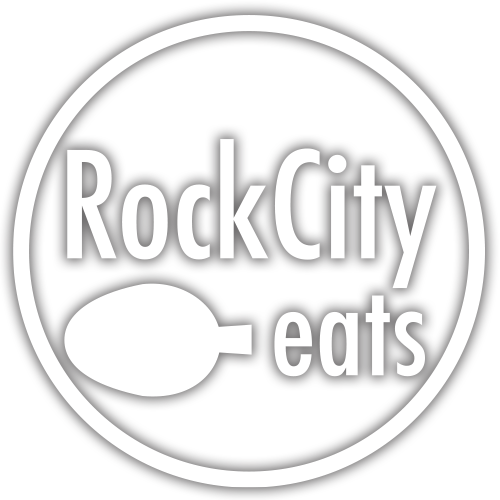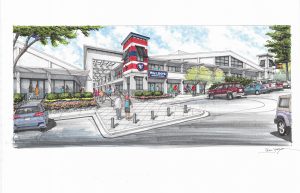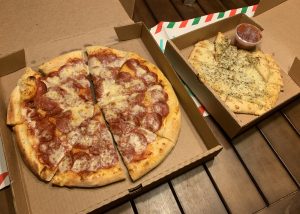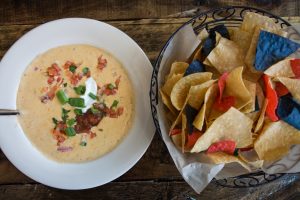In baseball, there are different pitchers for different situations. Some are great at starting a game and giving the team an advantage from the beginning. Some are great at coming in halfway through and continuing what was started. Others are great at coming in at the end and closing the game out as quickly as possible.
In my eight or so years of covering food, I’ve seen the same specialties emerge in kitchens. There are some chefs who are strong at opening a kitchen, strong at taking over kitchens, and I’ve even seen a few that can close down a kitchen quicker than anyone else. These specialties do not exist in every chef, some are equally good at every part, but when they do it can be special. However, when it comes to being a starting chef, Gwen Jones is an all-star.
I’ve been close to Jones through several openings now and watched her grow in her strength of opening a restaurant. Right now she is deep in setting up The Library Kitchen + Lounge, set to open just after the first of the year. I’ve begged her through several of these openings to do a food insider with us, she always points us in the direction of another employee she wants to highlight. Finally, I got her to agree before the other employees were hired.
What is it about opening restaurants that you like?
I love the unknown, I get really bored with routines. You start with a blank slate and get to figure it out as you go. There is also an element of chaos involved that is really fun because you never know what will go wrong on those first few opening days and you have to react quickly to figure it out. It is a lot of hard work but it never feels like hard work. It is fun.
I like being stretched and having to constantly figure out a better way to do things.
What restaurants have you had a part of opening now?
I opened my food truck, the Beast, helped Megan Kessler open Fork in the Road food truck, I came into Hillcrest Artisan Meats (H.A.M.) about 2 months after opening, helped with both Flyway and Lost Forty, then opened Southern Gourmasian, Kent Walker Artisan Cheese, Sauced, Rebel Kettle, and now The Library.
What did you love about the food truck?
It was so much fun, I think if I ever did another restaurant of my own it would be a food truck. I liked the fact that I could change what I wanted to, do what I wanted to, setup where I wanted to, but I had to keep myself accountable. Even if I am hungover I really need to go make money. It was always something new. New people, new problems, something new that broke. It always kept you on your toes.
What did you hate about the truck?
All of the above.
What made you want to get into restaurants?
I was going to go to culinary school and Brandon from H.A.M. talked me into doing a stage and I just fell right in.
We have talked a lot in the past about earning the title of a chef in a kitchen as opposed to people who just claim it with a degree. At this point, you have certainly earned your chef stripes, but you still refer to yourself as a butcher. Why is that?
I can create fundamental items and come up with things, but that is not where my training lies. I spent a lot of time and paid for my education to be a butcher so I feel like that is a unique thing about me. For instance, there are a ton of chefs in town but they still call me for ideas on how to break down animals.
It is what I feel like that is what is different about me. Yes, I can be a chef, but it doesn’t tell the story about what I am. Just like our friend Amanda Ivy can make a great dessert but calling her a pastry chef is not really who she is. I am one of the few female butchers in town who can break down a whole animal, and I like that about me, so I want to own it.
Do you ever see yourself someday settling down in a restaurant and doing it for the long haul?
No, probably not. I like being able to pop into different restaurants, even if I am not working there. I even like popping in here at Pizza D’s and having them show me things they are working on and bounce ideas off of me, or helping out with a friend who is opening something. I like having my hands in a lot of things and building relationships with people. I think being stuck in one restaurant that is really hard to have.
I do like seeing regulars when I am in a restaurant for a while, I always miss those relationships. But I like building relationships within the industry and learning new things because there is always a better way to do things.
You love to geek out on procedures and training more than others I’ve met. What do you love about that?
I like seeing things done well, and that is one of my favorite things about kitchens. I know I can do it and can do it well, but if I can teach a $10 an hour line cook how to do it then I am teaching them how to get a better job. I am teaching them how to earn more money and be worth more in this scene.
Part of what I’ve always respected about you is you always care about everyone else in the industry and want to help people in the industry succeed. I’ve watched you fight for higher wages for cooks, go out of your way to help train, and even pay for the education of your chefs so that they can do better. Why is all of that important?
All ships rise. My reputation is only as good as the people I’ve helped and the things I’ve shown an owner are worth their time. It is important investing in employees and giving them things like a work-life balance, education, two consecutive days off, child care, and things like that. If you show an employee that they are important then when you need someone who can cover an extra shift or come in when you get slammed they are there for you too. They are loyal. I like to prove to owners that it is worth it.
Also, it also builds relationships. I move around a lot, but if a walk-in cooler goes down I can call people to store some meat. If a truck shorts us something I can go borrow something. If you do not build good relationships you never have that.
This town is too tiny to not help everyone out. The stronger the service industry is the better it is for all of us. It even creates a better economy for our industry with better workers who care about their job. I think we need a lot more of that.
In my eight or so years of covering food, I’ve seen the same specialties emerge in kitchens. There are some chefs who are strong at opening a kitchen, strong at taking over kitchens, and I’ve even seen a few that can close down a kitchen quicker than anyone else. These specialties do not exist in every chef, some are equally good at every part, but when they do it can be special. However, when it comes to being a starting chef, Gwen Jones is an all-star.
I’ve been close to Jones through several openings now and watched her grow in her strength of opening a restaurant. Right now she is deep in setting up The Library Kitchen + Lounge, set to open just after the first of the year. I’ve begged her through several of these openings to do a food insider with us, she always points us in the direction of another employee she wants to highlight. Finally, I got her to agree before the other employees were hired.
What is it about opening restaurants that you like?
I love the unknown, I get really bored with routines. You start with a blank slate and get to figure it out as you go. There is also an element of chaos involved that is really fun because you never know what will go wrong on those first few opening days and you have to react quickly to figure it out. It is a lot of hard work but it never feels like hard work. It is fun.
I like being stretched and having to constantly figure out a better way to do things.
What restaurants have you had a part of opening now?
I opened my food truck, the Beast, helped Megan Kessler open Fork in the Road food truck, I came into Hillcrest Artisan Meats (H.A.M.) about 2 months after opening, helped with both Flyway and Lost Forty, then opened Southern Gourmasian, Kent Walker Artisan Cheese, Sauced, Rebel Kettle, and now The Library.
What did you love about the food truck?
It was so much fun, I think if I ever did another restaurant of my own it would be a food truck. I liked the fact that I could change what I wanted to, do what I wanted to, setup where I wanted to, but I had to keep myself accountable. Even if I am hungover I really need to go make money. It was always something new. New people, new problems, something new that broke. It always kept you on your toes.
What did you hate about the truck?
All of the above.
What made you want to get into restaurants?
I was going to go to culinary school and Brandon from H.A.M. talked me into doing a stage and I just fell right in.
We have talked a lot in the past about earning the title of a chef in a kitchen as opposed to people who just claim it with a degree. At this point, you have certainly earned your chef stripes, but you still refer to yourself as a butcher. Why is that?
I can create fundamental items and come up with things, but that is not where my training lies. I spent a lot of time and paid for my education to be a butcher so I feel like that is a unique thing about me. For instance, there are a ton of chefs in town but they still call me for ideas on how to break down animals.
It is what I feel like that is what is different about me. Yes, I can be a chef, but it doesn’t tell the story about what I am. Just like our friend Amanda Ivy can make a great dessert but calling her a pastry chef is not really who she is. I am one of the few female butchers in town who can break down a whole animal, and I like that about me, so I want to own it.
Do you ever see yourself someday settling down in a restaurant and doing it for the long haul?
No, probably not. I like being able to pop into different restaurants, even if I am not working there. I even like popping in here at Pizza D’s and having them show me things they are working on and bounce ideas off of me, or helping out with a friend who is opening something. I like having my hands in a lot of things and building relationships with people. I think being stuck in one restaurant that is really hard to have.
I do like seeing regulars when I am in a restaurant for a while, I always miss those relationships. But I like building relationships within the industry and learning new things because there is always a better way to do things.
You love to geek out on procedures and training more than others I’ve met. What do you love about that?
I like seeing things done well, and that is one of my favorite things about kitchens. I know I can do it and can do it well, but if I can teach a $10 an hour line cook how to do it then I am teaching them how to get a better job. I am teaching them how to earn more money and be worth more in this scene.
Part of what I’ve always respected about you is you always care about everyone else in the industry and want to help people in the industry succeed. I’ve watched you fight for higher wages for cooks, go out of your way to help train, and even pay for the education of your chefs so that they can do better. Why is all of that important?
All ships rise. My reputation is only as good as the people I’ve helped and the things I’ve shown an owner are worth their time. It is important investing in employees and giving them things like a work-life balance, education, two consecutive days off, child care, and things like that. If you show an employee that they are important then when you need someone who can cover an extra shift or come in when you get slammed they are there for you too. They are loyal. I like to prove to owners that it is worth it.
Also, it also builds relationships. I move around a lot, but if a walk-in cooler goes down I can call people to store some meat. If a truck shorts us something I can go borrow something. If you do not build good relationships you never have that.
This town is too tiny to not help everyone out. The stronger the service industry is the better it is for all of us. It even creates a better economy for our industry with better workers who care about their job. I think we need a lot more of that.





